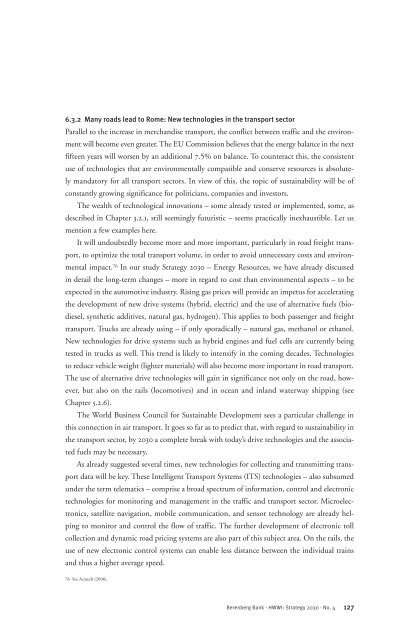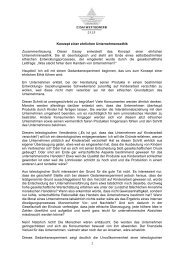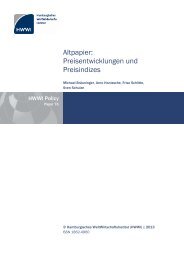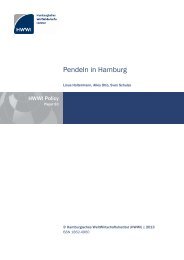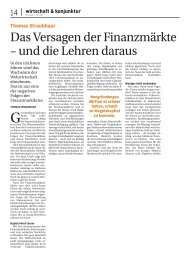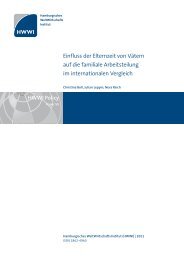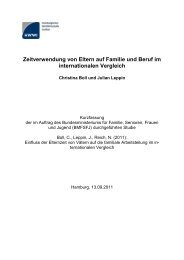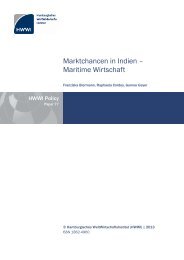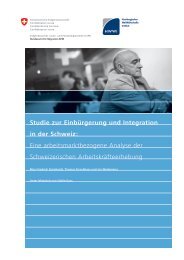Maritime Trade and Transport - HWWI
Maritime Trade and Transport - HWWI
Maritime Trade and Transport - HWWI
You also want an ePaper? Increase the reach of your titles
YUMPU automatically turns print PDFs into web optimized ePapers that Google loves.
6.3.2 Many roads lead to Rome: New technologies in the transport sector<br />
Parallel to the increase in merch<strong>and</strong>ise transport, the conflict between traffic <strong>and</strong> the environment<br />
will become even greater. The EU Commission believes that the energy balance in the next<br />
fifteen years will worsen by an additional 7.5% on balance. To counteract this, the consistent<br />
use of technologies that are environmentally compatible <strong>and</strong> conserve resources is absolutely<br />
m<strong>and</strong>atory for all transport sectors. In view of this, the topic of sustainability will be of<br />
constantly growing significance for politicians, companies <strong>and</strong> investors.<br />
The wealth of technological innovations – some already tested or implemented, some, as<br />
described in Chapter 3.2.1, still seemingly futuristic – seems practically inexhaustible. Let us<br />
mention a few examples here.<br />
It will undoubtedly become more <strong>and</strong> more important, particularly in road freight transport,<br />
to optimize the total transport volume, in order to avoid unnecessary costs <strong>and</strong> environmental<br />
impact. 76 In our study Strategy 2030 – Energy Resources, we have already discussed<br />
in detail the long-term changes – more in regard to cost than environmental aspects – to be<br />
expected in the automotive industry. Rising gas prices will provide an impetus for accelerating<br />
the development of new drive systems (hybrid, electric) <strong>and</strong> the use of alternative fuels (biodiesel,<br />
synthetic additives, natural gas, hydrogen). This applies to both passenger <strong>and</strong> freight<br />
transport. Trucks are already using – if only sporadically – natural gas, methanol or ethanol.<br />
New technologies for drive systems such as hybrid engines <strong>and</strong> fuel cells are currently being<br />
tested in trucks as well. This trend is likely to intensify in the coming decades. Technologies<br />
to reduce vehicle weight (lighter materials) will also become more important in road transport.<br />
The use of alternative drive technologies will gain in significance not only on the road, however,<br />
but also on the rails (locomotives) <strong>and</strong> in ocean <strong>and</strong> inl<strong>and</strong> waterway shipping (see<br />
Chapter 5.2.6).<br />
The World Business Council for Sustainable Development sees a particular challenge in<br />
this connection in air transport. It goes so far as to predict that, with regard to sustainability in<br />
the transport sector, by 2030 a complete break with today’s drive technologies <strong>and</strong> the associated<br />
fuels may be necessary.<br />
As already suggested several times, new technologies for collecting <strong>and</strong> transmitting transport<br />
data will be key. These Intelligent <strong>Transport</strong> Systems (ITS) technologies – also subsumed<br />
under the term telematics – comprise a broad spectrum of information, control <strong>and</strong> electronic<br />
technologies for monitoring <strong>and</strong> management in the traffic <strong>and</strong> transport sector. Microelectronics,<br />
satellite navigation, mobile communication, <strong>and</strong> sensor technology are already helping<br />
to monitor <strong>and</strong> control the flow of traffic. The further development of electronic toll<br />
collection <strong>and</strong> dynamic road pricing systems are also part of this subject area. On the rails, the<br />
use of new electronic control systems can enable less distance between the individual trains<br />
<strong>and</strong> thus a higher average speed.<br />
76 See Acatech (2006).<br />
Berenberg Bank · <strong>HWWI</strong>: Strategy 2030 · No. 4<br />
127


